Anti-government demonstrators wave a Venezuelan flag during a protest against Venezuela's President Nicolas Maduro in Caracas, Venezuela, Saturday, Aug. 12, 2017. Opposition members called a demonstration to protest the seating of a special assembly to rewrite the constitution. Observers will be closely watching the turnout as the arrest of several mayors and the opposition's decision to compete in regional elections despite concerns the election for the constitutional assembly was marred by fraud. (AP Photo/Ariana Cubillos)
The Associated Press
CARACAS, Venezuela (AP) - The Latest on Venezuela's political crisis (all times local):
2:45 p.m.
Venezuela's newly installed constitutional assembly has decided to push up gubernatorial elections by two months to October, though many in the opposition see it as a false promise unlikely to ever materialize.
Delegates to the all-powerful body rewriting the South American nation's constitution voted unanimously Saturday to hold elections in all 23 states Oct. 10.
They were supposed to take place last year but were delayed twice. Critics say the government feared a thumping at the polls amid a crushing economic crisis that has collapsed support for its socialist revolution.
Opposition parties swallowed a tough pill this week and met a deadline to enroll candidates despite widespread mistrust in electoral authorities. The constitutional assembly could still decide to scrap elections altogether or alter the voting rules.
On Friday it refused to ratify the lone opposition member on the electoral board after he refused to show up and swear obedience to the constitutional assembly.
___
2:45 p.m.
The South American trade bloc Mercosur is criticizing U.S. President Donald Trump's suggestion of a possible "military option" to deal with the crisis in Venezuela.
The bloc consisting of Argentina, Brazil, Paraguay and Uruguay says in a statement Saturday that "the only acceptable means of promoting democracy are dialogue and diplomacy."
It adds that "the repudiation of violence and any option that implies the use of force is inalienable and constitutes the fundamental basis for democratic coexistence."
Mercosur has also been critical of Venezuelan President Nicolas Maduro's creation of an all-powerful special assembly. Last week the bloc suspended Venezuela indefinitely for failing to uphold democratic norms.
___
12:35 p.m.
The government of Colombia is also rejecting President Donald Trump's suggestion of a possible "military option" to resolve the deepening crisis in Venezuela.
The Foreign Ministry says in a statement that it condemns "military measures and the use of force," and that all efforts to resolve Venezuela's crisis should be peaceful and respect its sovereignty.
President Juan Manuel Santos has called his Venezuelan counterpart Nicolas Maduro a dictator and held out the possibility of breaking off diplomatic relations if Maduro doesn't reverse course on measures seen as increasingly authoritarian.
Saturday's statement by the Foreign Ministry reiterated concerns about a "breakdown in the democratic order" in Venezuela and called for the U.N. secretary-general to help negotiate a solution.
The reaction from Washington's staunchest ally in South America comes a day before U.S. Vice President Mike Pence arrives in Colombia to begin a four-nation tour of the region.
U.S. officials previewing the trip before Trump's remarks said Venezuela is expected to feature prominently in Pence's discussions with leaders.
___
12:25 p.m.
Venezuela's government is energetically rejecting U.S. President Donald Trump's talk of a potential "military option" to resolve the country's political crisis, calling it the most egregious act of belligerence against Venezuela in a century and a threat to Latin America's stability.
The response came in a statement read Saturday by Foreign Minister Jorge Arreaza in a meeting with foreign diplomats. They included Lee McClenny, the head of the U.S. embassy in Caracas.
Arreaza called Trump the "boss of the empire" and said his comments fit a pattern of aggression against Venezuelan sovereignty and violate international law and the U.N. charter.
Arreaza accused Washington of seeking to destabilize and divide Latin America and the Caribbean. He also thanked several governments, including ones recently critical of President Nicolas Maduro, for condemning Trump's comments.
Arreaza called on "good-minded" Venezuelans to put aside their political differences and unite in rejecting Trump's comments.
___
11:55 a.m.
The top U.S. diplomat in Venezuela has arrived to hear what is likely to be a stinging rebuke to President Donald Trump's talk of a possible "military option" to resolve the country's political crisis.
A straight-faced Lee McClenny walked into the colonial government building known as the Yellow House in Caracas on Saturday along with other foreign diplomats for a meeting with Foreign Minister Jorge Arreaza. He did not make any comments.
Following the meeting Arreaza is expected to deliver a government statement responding to Trump's remarks, which have been panned by government allies as a dramatic escalation of the country's political conflict.
The United States and Venezuela have not exchanged ambassadors since 2010. McClenny has been serving as charge d'affaires in Caracas since 2014.
A masked anti-government demonstrators attends a protest against Venezuela's President Nicolas Maduro in Caracas, Venezuela, Saturday, Aug. 12, 2017. Opposition members called a demonstration to protest the seating of a special assembly to rewrite the constitution. Observers will be closely watching the turnout as the arrest of several mayors and the opposition's decision to compete in regional elections despite concerns the election for the constitutional assembly was marred by fraud. (AP Photo/Ariana Cubillos)
The Associated Press
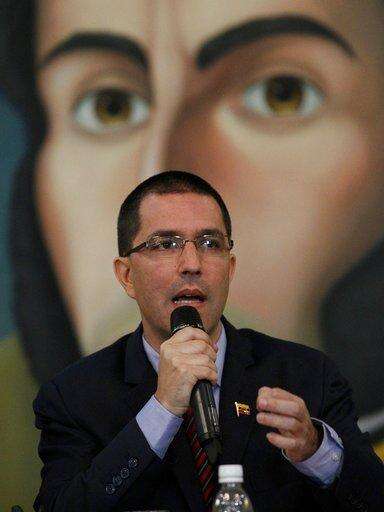
Venezuela's Foreign Minister Jorge Arreaza speaks during a meeting with the diplomatic corps at his offices in Caracas, Venezuela, Saturday, Aug. 12, 2017. Venezuela's government is energetically rejecting US President Donald Trump's talk of a "military option" to resolve the country's political crisis, calling it the most-egregious act of belligerence against the country in a century and a threat to Latin America's stability. The picture at the background is the Venezuelan hero Simon Bolivar (AP Photo/Ariana Cubillos)
The Associated Press
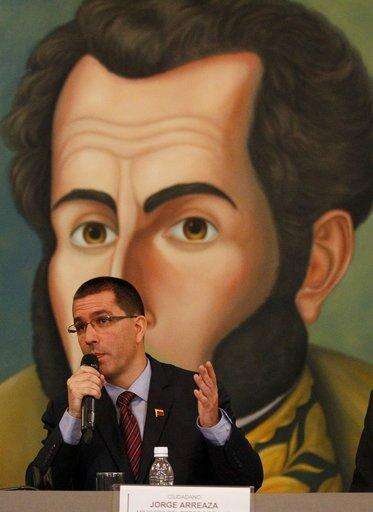
Venezuela's Foreign Minister Jorge Arreaza speaks during a meeting with the diplomatic corps at his offices in Caracas, Venezuela, Saturday, Aug. 12, 2017. Venezuela's government is energetically rejecting US President Donald Trump's talk of a "military option" to resolve the country's political crisis, calling it the most-egregious act of belligerence against the country in a century and a threat to Latin America's stability. The picture at the background is the Venezuelan hero Simon Bolivar (AP Photo/Ariana Cubillos)
The Associated Press
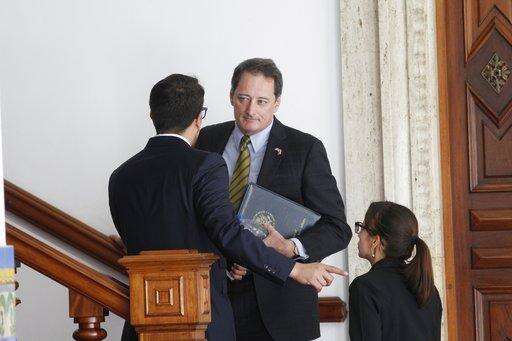
Lee McClenny, center, Chargé d'Affaires of the U.S. Embassy in Caracas speaks with two protocol officers of Venezuelan Foreign Minter office upon his arrival for a meeting with Venezuela's Foreign Ministry Jorge Arreaza in Caracas, Venezuela, Saturday, Aug. 12, 2017. President Donald Trump's talk of a "military option" in Venezuela risks alienating governments in Latin America that had overcome their reluctance to work with the immigrant-bashing Republican leader and adopt a common, hard line approach to isolating the country's socialist government. (AP Photo/Ariana Cubillos)
The Associated Press
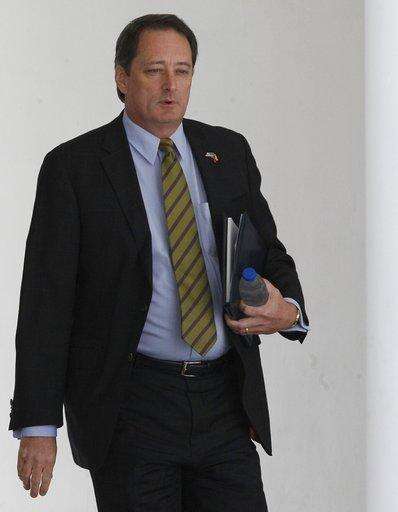
Lee McClenny, center, Chargé d'Affaires of the U.S. Embassy in Caracas arrives for a meeting with Venezuela's Foreign Ministry Jorge Arreaza in Caracas, Venezuela, Saturday, Aug. 12, 2017. President Donald Trump's talk of a "military option" in Venezuela risks alienating governments in Latin America that had overcome their reluctance to work with the immigrant-bashing Republican leader and adopt a common, hard line approach to isolating the country's socialist government. (AP Photo/Ariana Cubillos)
The Associated Press
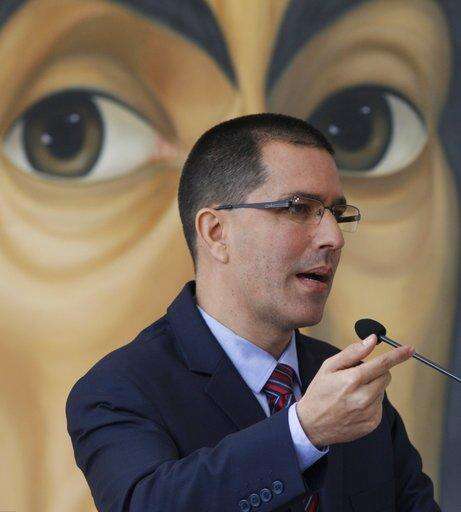
Venezuela's Foreign Minister Jorge Arreaza speaks during a meeting with the diplomatic corps at his offices in Caracas, Venezuela, Saturday, Aug. 12, 2017. Venezuela's government is energetically rejecting US President Donald Trump's talk of a "military option" to resolve the country's political crisis, calling it the most-egregious act of belligerence against the country in a century and a threat to Latin America's stability. The picture at the background is the Venezuelan hero Simon Bolivar (AP Photo/Ariana Cubillos)
The Associated Press
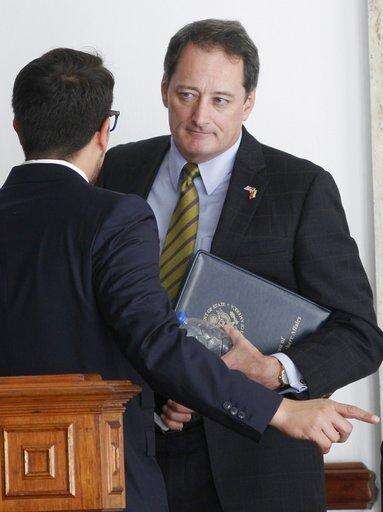
Lee McClenny, right, Chargé d'Affaires of the U.S. Embassy in Caracas speaks with a protocol officer of Venezuelan Foreign Ministry office upon his arrival for a meeting with Venezuela's Foreign Ministry Jorge Arreaza in Caracas, Venezuela, Saturday, Aug. 12, 2017. President Donald Trump's talk of a "military option" in Venezuela risks alienating governments in Latin America that had overcome their reluctance to work with the immigrant-bashing Republican leader and adopt a common, hard line approach to isolating the country's socialist government. (AP Photo/Ariana Cubillos)
The Associated Press
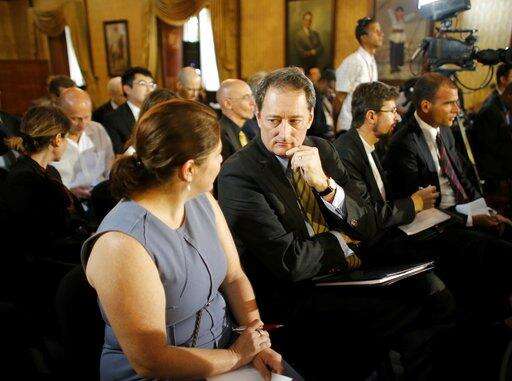
Lee McClenny, center, Chargé d'Affaires of the U.S. Embassy in Caracas speaks with unidentified woman prior a meeting with Venezuela's Foreign Ministry Jorge Arreaza at his office in Caracas, Venezuela, Saturday, Aug. 12, 2017. The head of the U.S. Embassy in Caracas has answered the government's call to be present when it delivers what's likely to be a stinging rebuke to Trump's talk of a "military option" to resolve Venezuela's crisis. (AP Photo/Ariana Cubillos)
The Associated Press